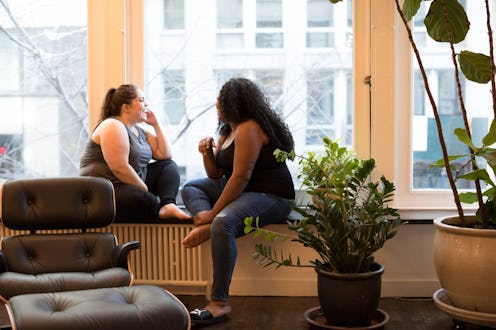Life
How To Support A Friend Who's Struggling This Mother's Day

Rachel Thomas is the President of OptionB.Org and LeanIn.Org. In this op-ed, she explains how you can support a friend who’s struggling this Mother’s Day.
Mother’s Day is a chance to celebrate all the mothers in our lives. For many, it’s a happy day — an opportunity to spend time with loved ones and tell them how much they matter to you. But for some, Mother’s Day is painful. Maybe they’ve lost their mom or child, or have an uneasy relationship with their mom. Maybe they’re struggling with infertility, or they’re part of an LGBTQ family and feel like typical Mother’s Day celebrations leave their family out. If your friend or loved one is feeling sad or isolated this Mother’s Day, there are things you can do to show you’re thinking of them.
At OptionB.Org, our mission is to help people build resilience in the face of adversity, as well as in their everyday lives. We launched #OptionBThere to counter the pressure to put on a happy face during the holidays and to give friends and family advice for how to be there for people going through something difficult. We want to send the opposite message: whatever you’re dealing with, you have the right to your feelings and you deserve support.
1. Be thoughtful about how you address your friend — or anyone, for that matter — on Mother’s Day.
It can be tempting to wish a “Happy Mother’s Day!” to everyone. If you do that with the people in your life, your heart may be in the right place — but you may unintentionally hurt someone’s feelings. Before you say “Happy Mother’s Day,” pause and consider what’s going on in your friend’s life. Then, you can acknowledge the occasion in a way that’s sensitive to their situation. Maybe that means saying “I’m thinking of you today” to a friend who’s lost their mom, or “I hope you have a great day with people you love” to someone whose relationship with their mom is strained. Maybe it means not mentioning the day at all.
2. If your friend has shared their fertility struggles with you, consider an adults-only activity.
Many of us have friends who badly want to become parents, but for one reason or another, it hasn’t happened. If that’s the case for someone you care about, consider inviting them on a grown-up outing this Mother’s Day. Take them to an art gallery. Go to a wine tasting. Buy orchestra tickets. Taking a break from places full of happy parents and children can be a gift to someone who’s struggling on this front.
3. If your friend has lost a child, consider honoring that child’s memory, if your friend is open to it.
If your friend is a grieving parent, there’s nothing anyone can do to take away their pain. But you can be there for them. Maybe they want to reminisce about their child; many grieving parents say how hard it is when the people in their lives stop mentioning their child after they’re gone. If you think it would bring your friend solace, you could give them a thoughtful gift, like baking their child’s favorite cookies and leaving them at the door with a note. If your friend just wants to take their mind off the day, you can help with that, too. Take them to the movies, bowling, karaoke — whatever they’d enjoy.
4. If your friend has lost their mother, don’t complain about yours.
This mistake is all too easy to make. Many of us good-naturedly complain about our moms, mothers-in-law, or children from time to time. Sometimes it’s not even so good-natured; for people who are estranged from family members, talking with friends can help let off steam. Often, that’s fine. But if your friend has lost their mother or someone else close to them, those comments can sting, especially on Mother’s Day. Be mindful of your friend’s feelings. Save your complaints for another time or audience.
5. If your friend is part of an LGBTQ family, respect how they do — or do not — celebrate Mother’s Day.
For LGBTQ families, there is no one-size-fits-all approach to Mother’s Day. Couples may choose to celebrate one, both, or neither parent. Transgender or gender nonconforming parents may put their own spin on the day. If you’re not sure how your friend’s family celebrates Mother’s Day, respectfully ask. In a world that too often makes LGBTQ families feel like outsiders, the important thing is to make the people you care about feel seen, included, and respected.
At its best, Mother’s Day is about love, connection, and gratitude. That is, it’s not just about celebrating moms. It’s also about showing the people we care about that we’re there for them—whatever their circumstances, whatever they’re going through. Feeling down on Mother’s Day can be a lonely experience. With mindfulness, respect, and care, we can overcome that together.
Find additional tips on how to be there for others and learn more about OptionB.Org's #OptionBThere for Mother's Day program here.